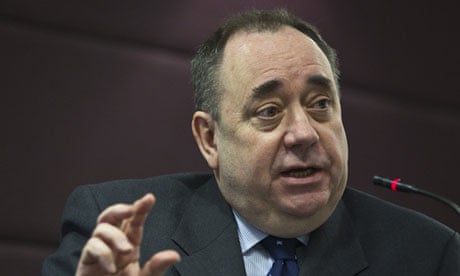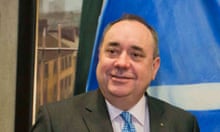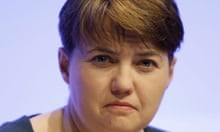Alex Salmond's preferred referendum question on Scottish independence has been rejected by the Electoral Commission, which has recommended using a more neutral question.
The elections watchdog said the Scottish first minister's choice of question – "Do you agree that Scotland should be an independent country?" – was biased in favour of a yes vote and should be dropped.
After testing the issue with voters and language experts, it recommended the question put to Scotland's 4 million voters in the autumn of 2014 be changed to: "Should Scotland be an independent country: yes/no?"
The ruling is a blow to Salmond, who had insisted last year that his original question was "straightforward and clear". The Scottish National party leader rejected criticism from polling experts and his opponents, who said the word "agree" clearly invited voters to vote yes.
Over the last few weeks, his government has anticipated the commission's findings by adopting a more conciliatory stance. On Tuesday, Nicola Sturgeon, the deputy first minister, said the administration would give "considerable weight" to the commission's judgement, opening the way for a climbdown.
She told MSPs that the Scottish government would need "a very good reason" before ignoring its findings.
John McCormick, the Scottish electoral commissioner, said Salmond's question had been it had rigorously tested. "Any referendum question must be, and be seen to be, neutral. People told us that they felt the words 'do you agree' could lead voters towards voting yes," he said. "People had a clear understanding that 'independent country' meant being separate from the UK."
In another finding published by the commission, the Scottish government and pro-independence Yes Scotland campaign have won a partial victory over funding limits for political parties in the referendum campaign.
Both had feared spending limits could be too high and weighted in favour of the pro-UK parties and anti-independence campaign. Instead, under the commission's proposals, the two pro-independence parties, the SNP and Scottish Greens, would be allowed to spend £1.49m in total, while the pro-UK Labour, Tories and Lib Dems have a collective limit of £1.43m.
Indicating that around £6m may be spend during the official campaign next year, the commission has ruled that party spending limits should be based on each's vote in the Holyrood election in 2011.
But Salmond failed to persuade the commission to cap spending for the two official "yes" and "no" campaigns at £750,000 each, recommending a £1.5m limit for both sides – double the SNP's recommendations. That decision could now lead to an angry dispute.
Last October, Sturgeon had told the SNP annual conference it would strongly resist moves to allow their opponents to outspend them, stating: "Make no mistake, this time around, Scotland's future will not be bought and sold for anyone's gold."
Even so, Blair Jenkins, the chief executive of the Yes Scotland campaign, welcomed both reports. He said the spending limits meant a level-playing field and that he was very pleased with the new question.
"Agreement over the referendum question will mean another major piece of the process jigsaw is in place and we can continue to move the debate from the 'how' to the 'why' of an independent Scotland," Jenkins said.





Comments (…)
Sign in or create your Guardian account to join the discussion